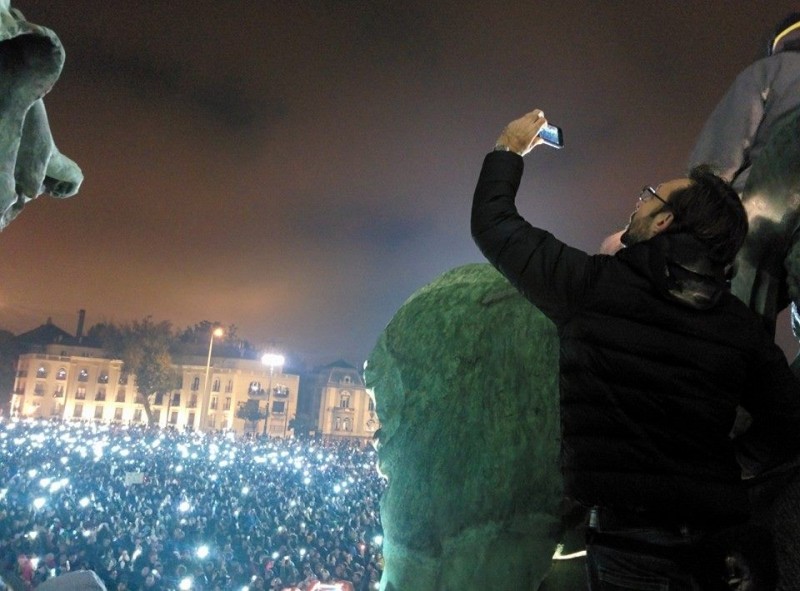
Protests in Budapest, October 2014. Photo by Marietta Le, used with permission.
The Advox Netizen Report offers an international snapshot of challenges, victories, and emerging trends in internet rights around the world.
This week, we're looking back at seven years of covering global digital rights news in celebration of our 300th edition!
When we first launched the Netizen Report in 2011, we set out to create weekly record of how people around the world were exercising free expression through technology — and the barriers and threats they faced.
We have covered the digital rights ramifications of social movements from Hong Kong to Ukraine to Venezuela, attacks on digital activism from Cuba to Bahrain to Tanzania, and internet-focused legislation in more than 100 countries on every continent.
‘Netizen’ is not just a clever portmanteau
The term first came into use in mainland China, where online communities began to refer to themselves as wǎngmín (网民, literally “net-citizen”) and wǎngyǒu (网友, literally “net-friend”).
Beyond the clever wordplay, these communities built spaces where people could speak up, criticize and debate in a way that was not possible in Chinese society. Netizens intentionally identified themselves as active citizens on the internet, in sharp contrast to their existence in real life.
In countries like Ethiopia, Morocco and Syria our team has followed the trials and prison terms of bloggers and online activists whose work sparked widespread change for their communities and triggered enduring legal threats from their own governments.
We are not writing about digital rights in principle or in theory — we are writing about how they play out for real people. Week after week, our team of volunteers work to show how online expression has become a formidable force in public life and how this empowers communities and political movements alongside state and other powerful actors.
Over time, our reports have tracked how one sweeping event — an environmental disaster, a refugee crisis, a violent attack — can trigger a wave of reaction that results in threats to online rights around the world. And we have followed the remarkably global trends in legal repression of speech that affect so many people around the world, but don’t always make the headlines.
Here are some of our all-time favorite editions of the Netizen Report, showing the range and depth of our work since 2011.
Working in the public interest can get you arrested: Digital activists under fire
The rights of an individual speaking truth to power lie at the core of Global Voices’ advocacy work. Week after week, we have covered threats against freedom of speech, ranging from arrests of the #Istanbul10 activists in Turkey to prosecution of the Zone9 bloggers in Ethiopia to multiple years of fatal attacks on bloggers in Bangladesh.
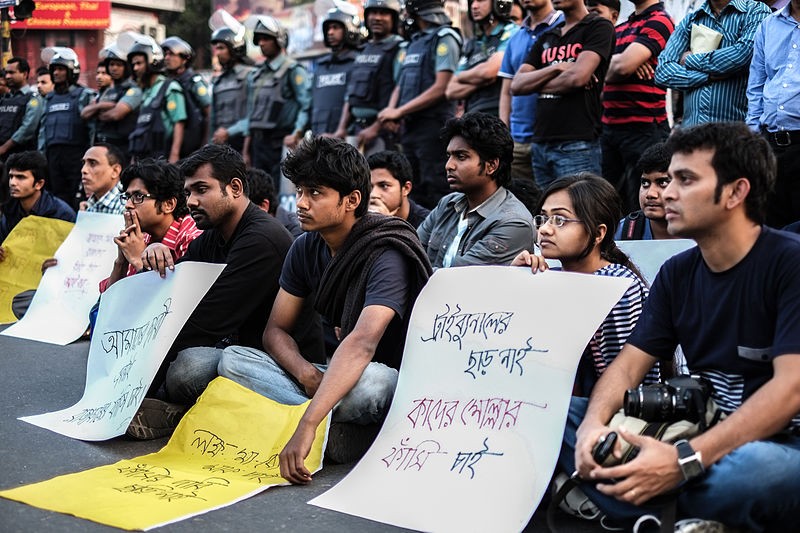
Demonstrators call for capital punishment for war criminals in Bangladesh, 2013. Photo by Mehdi Hasan Khan via Wikimedia (CC BY-SA 3.0)
Post-Charlie chilling effects: Censorship in the name of national security
The Charlie Hebdo attack in Paris sparked critical debate over the importance of free expression, and led several governments in the EU and beyond to restrict free speech and increase their surveillance powers. This is just one of many instances where governments have used the threat of violent extremism as a justification for limiting free speech and other fundamental rights — an enduring theme for the Netizen Report.
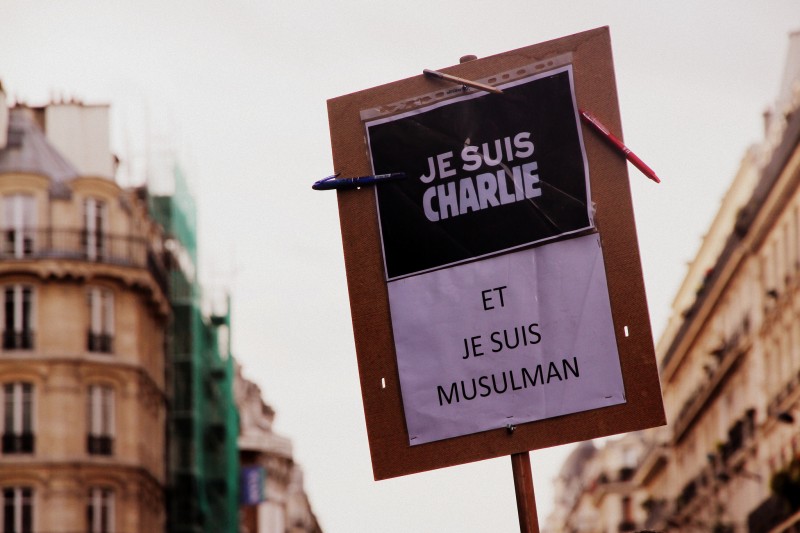
“I am Charlie … and I am Muslim.”
In ‘state of emergency’, internet shutdowns leave citizens struggling to connect
Political upheaval and public protest in many countries has triggered a “state of emergency”, justifying the suspension of many fundamental rights and enduring internet shutdowns. This edition focused on Ethiopia and Venezuela, just two of the many countries where shutdowns have occurred. We've also covered internet and social media shutdowns in China, Syria, Pakistan, Cameroon, Iran, Togo, India, Iraq, Egypt, Gabon, D. R. Congo, Somalia, and Sudan.
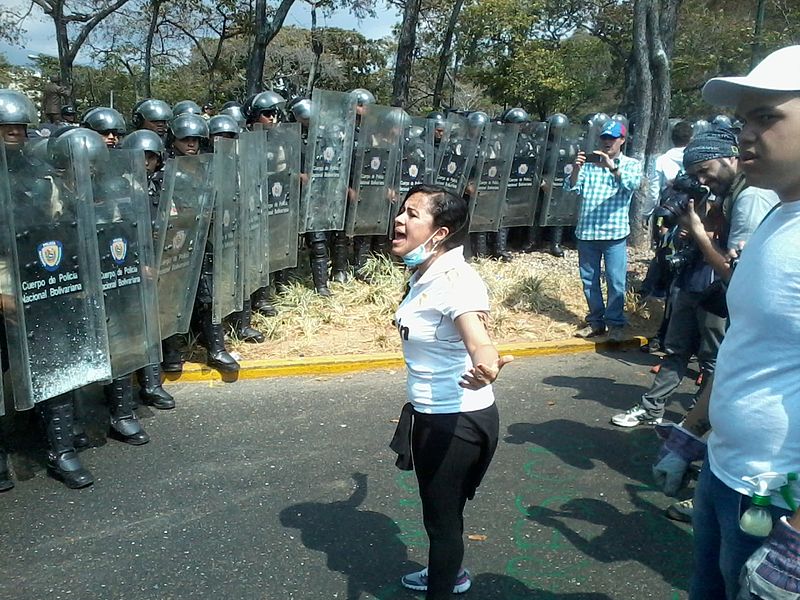
A student demonstrator speaks to National Guard members in Venezuela, during protests in 2014. Photo by Jamez42 via Wikimedia Commons (CC0)
You can’t encrypt, but we can spy: The Hacking Team leaks
A massive leak of internal documents from the Italian surveillance software firm Hacking Team proved that governments were spying on journalists, human rights advocates, and political opposition groups — this confirmed years of suspicion and evidence of malware targeting that we documented in the Netizen Report. Our community covered the impact of these events in Bahrain, Ecuador, Egypt, Lebanon, Mexico and Serbia.

Cartoon by Doaa Eladl via Flickr, Web We Want ( CC BY-SA 2.0)
Activists demand answers from Facebook
As a community of writers and activists, we’ve faced censorship, harassment and direct threats because of our activism on Facebook since the early days of the platform. The Netizen Report archive shows countless examples of discrimination and harassment on the platform, highlights our in-depth research on Free Basics (Facebook’s project to create an “internet on ramp” for people in developing countries), and has documented the uproar from activists demanding answers from the platform following the Cambridge Analytica revelations.
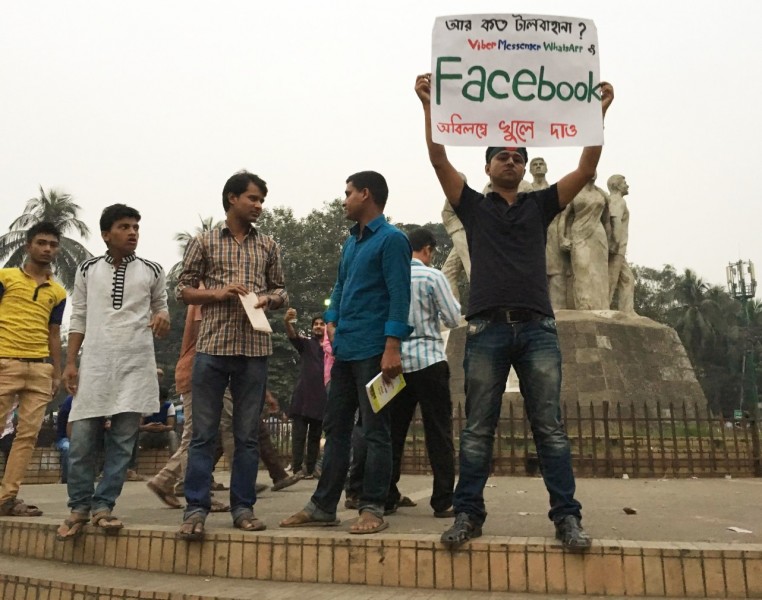
A protester near the Teacher Students Centre (TSC) of Dhaka University. The poster reads “How many excuses more? Open Viber, Messenger, WhatsApp and Facebook NOW.” Photo by Zaid Islam, under copyright. Used with permission.
With an ever-evolving team of writers, researchers, activists and human rights experts from 41 countries (full list below) and the steadfast support of Global Voices editors, we’ve produced 300 editions of the Netizen Report since 2011.
This week on Twitter, join us in raising a virtual glass to our collective efforts. Here’s to many more years of capturing the global story of human rights and internet!
Yours truly,
The Netizen Report Team
Abir Ghattas, Afef Abrougui, Alex Laverty, Alexey Kovalev, Amira Al Hussaini, Angel Carrión, Arzu Geybullayeva, Asteris Masouras, Bojan Perkov, Corey Abramson, Diego Casaes, Dragan Kucirov, Elaine Díaz, Elizabeth Rivera, Ellery Roberts Biddle, Endalk Chala, Filip Stojanovski, Firuzeh Shokooh Valle, Georgia Popplewell, Hae-in Lim, Hisham Almiraat, Inji Pennu, Ivan Sigal, J. Tadeo, James Losey, Janine Mendes-Franco, Jessica Dheere, Jillian York, Joey Ayoub, Juan Arellano, Juke Carolina, Karolle Rabarison, Kevin Rothrock, Kofi Yeboah, L. Finch, Laura Vidal, Leila Nachawati, Lisa Ferguson, Lova Rakotomalala, Don Le, Marietta Le, Mahsa Alimardani, Marianne Díaz, Mohamad Najem, Mohamed ElGohary, Mong Palatino, Nevin Thompson, Nwachukwu Egbunike, Oiwan Lam, Pauline Ratze, Rayna St, Rebecca MacKinnon, Renata Avila, Rezwan, Rohith Jyothish, Sadaf Khan, Sahar Habib Ghazi, Salma Essam, Sarah Myers West, Silvia Viñas, Solana Larsen, Suzanna Lehn, Taisa Sganzerla, Talal Raza, Tanya Lokot, Tetyana Bohdanova, Tom Risen, Torie Bosch, Weiping Li and Yuqi Chen have contributed to one or multiple Netizen Reports since 2011.
Netizen Report contributors come from Azerbaijan, Bahrain, Bangladesh, Brazil, Bulgaria, China, Egypt, Ethiopia, France, Ghana, Greece, Guatemala, Hong Kong, Hungary, India, Indonesia, Japan, Iran, Kenya, Lebanon, Macedonia, Madagascar, Mexico, Morocco, Nigeria, Pakistan, Peru, Philippines, Puerto Rico, Russia, Serbia, South Korea, Spain, Switzerland, Syria, Taiwan, Tunisia, Turkey, Ukraine, United States, Venezuela and Vietnam.
Subscribe to the Netizen Report







